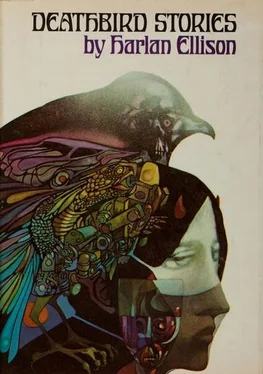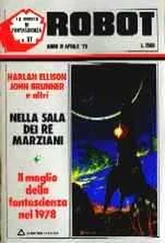He waved. The eye blinked.
Now it begins. he thought.
Lawrence Talbot stood at the lip of the huge crater that formed Lawrence Talbot’s navel. He looked down in the bottomless pit with its atrophied remnants of umbilicus forming loops and protuberances, smooth and undulant and vanishing into utter darkness. He stood poised to descend and smelled the smells of his own body. First, sweat. Then the smells that wafted up from within. The smell of penicillin like biting down on tin foil with a bad tooth. The smell of aspirin, chalky and tickling the hairs of his nose like cleaning blackboard erasers by banging them together. The smells of rotted food, digested and turning to waste. All the odors rising up out of himself like a wild symphony of dark colors.
He sat down on the rounded rim of the navel and let himself slip forward.
He slid down, rode over an outcropping, dropped a few feet and slid again, tobogganing into darkness. He fell for only a short time, then brought up against the soft and yielding, faintly springy tissue plane where the umbilicus had been ligated. The darkness at the bottom of the hole suddenly shattered as blinding light filled the navel. Shielding his eyes, Talbot looked up the shaft toward the sky. A sun glowed there, brighter than a thousand novae. Victor had moved a surgical lamp over the hole to assist him. For as long as he could.
Talbot saw the umbra of something large moving behind the light, and he strained to discern what it was: it seemed important to know what it was. And for an instant, before his eyes closed against the glare, he thought he knew what it had been. Someone watching him, staring down past the surgical lamp that hung above the naked, anesthetized body of Lawrence Talbot, asleep on an operating table.
It had been the old woman, Nadja.
He stood unmoving for a long time, thinking of her.
Then he went to his knees and felt the tissue plane that formed the floor of the navel shaft.
He thought he could see something moving beneath the surface, like water flowing under a film of ice. He went down onto his stomach and cupped his hands around his eyes, putting his face against the dead flesh. It was like looking through a pane of isinglass. A trembling membrane through which he could see the collapsed lumen of the atretic umbilical vein. There was no opening. He pressed his palms against the rubbery surface and it gave, but only slightly. Before he could find the treasure, he had to follow the route of Demeter’s map—now firmly and forever consigned to memory—and before he could set foot upon that route, he had to gain access to his own body.
But he had nothing with which to force that entrance.
Excluded, standing at the portal to his own body, Lawrence Talbot felt anger rising within him. His life had been anguish and guilt and horror, had been the wasted result of events over which he had had no control. Pentagrams and full moons and blood and never putting on even an ounce of fat because of a diet high in protein, blood steroids healthier than any normal adult male’s, triglycerol and cholesterol levels balanced and humming. And death forever a stranger. Anger flooded through him. He heard an inarticulate little moan of pain, and fell forward, began tearing at the atrophied cord with teeth that had been used for just such activity many times before. Through a blood haze he knew he was savaging his own body, and it seemed exactly the appropriate act of self-flagellation.
An outsider; he had been an outsider all his adult life, and fury would permit him to be shut out no longer. With demonic purpose he ripped away at the clumps of flesh until the membrane gave, at last, and a gap was tom through opening him to himself….
And he was blinded by the explosion of light, by the rush of wind, by the passage of something that had been just beneath the surface writhing to be set free, and in the instant before he plummeted into unconsciousness, he knew Castafieda’s Don Juan had told the truth: a thick bundle of white cobwebby filaments, tinged with gold, fibers of light, shot free from the collapsed vein, rose up through the shaft and trembled toward the antiseptic sky.
A metaphysical, otherwise invisible beanstalk that trailed away above him, rising up and up and up as his eyes closed and he sank away into oblivion.
He was on his stomach, crawling through the collapsed lumen, the center, of the path the veins had taken back from the amniotic sac to the fetus. Propelling himself forward the way an infantry scout would through dangerous terrain, using elbows and knees, frog-crawling, he opened the flattened tunnel with his head just enough to get through. It was quite light, the interior of the world called Lawrence Talbot suffused with a golden luminescence.
The map had routed him out of this pressed tunnel through the inferior vena cava to the right atrium and thence through the right ventricle, the pulmonary arteries, through the valves, to the lungs, the pulmonary veins, crossover to the left side of the heart (left atrium, left ventricle), the aorta—bypassing the three coronary arteries above the aortic valves—and down over the arch of the aorta—bypassing the carotid and other arteries—to the celiac trunk, where the arteries split in a confusing array: the gastroduodenal to the stomach, the hepatic to the liver, the splenic to the spleen. And there, dorsal to the body of the diaphragm, he would drop down past the greater pancreatic duct to the pancreas itself. And there, among the islets of langerhans, he would find, at the coordinates Information Associates had given him, he would find that which had been stolen from him one full-mooned night of horror so very long ago. And having found it, having assured himself of eternal sleep, not merely physical death from a silver bullet, he would stop his heart—how, he did not know, but he would—and it would all be ended for Lawrence Talbot, who had become what he had beheld. There, in the tail of the pancreas, supplied with blood by the splenic artery, lay the greatest treasure of all. More than doubloons, more than spices and silks, more than oil lamps used as djinn prisons by Solomon, lay final and sweet eternal peace, a release from monsterdom.
He pushed the final few feet of dead vein apart, and his head emerged into open space. He was hanging upside-down in a cave of deep orange rock.
Talbot wriggled his arms loose, braced them against what was clearly the ceiling of the cave, and wrenched his body out of the tunnel. He fell heavily, trying to twist at the last moment to catch the impact on his shoulders, and received a nasty blow on the side of the neck for his trouble.
He lay there for a moment, clearing his head. Then he stood and walked forward. The cave opened onto a ledge, and he walked out and stared at the landscape before him. The skeleton of something only faintly human lay tortuously crumpled against the wall of the cliff. He was afraid to look at it very closely.
He stared off across the world of dead orange rock, folded and rippled like a topographical view across the frontal lobe of a brain removed from its cranial casing.
The sky was a light yellow, bright and pleasant.
The grand canyon of his body was a seemingly horizonless tumble of atrophied rock, dead for millennia. He sought out and found a descent from the ledge, and began the trek.
There was water, and it kept him alive. Apparently, it rained more frequently here in this parched and stunned wasteland than appearance indicated. There was no keeping track of days or months, for there was no night and no day—always the same even, wonderful golden luminescence—but Talbot felt his passage down the central spine of orange mountains had taken him almost six months. And in that time it had rained forty-eight times, or roughly twice a week. Baptismal fonts of water were filled at every downpour, and he found if he kept the soles of his naked feet moist, he could walk without his energy flagging. If he ate, he did not remember how often, or what form the food had taken.
Читать дальше












